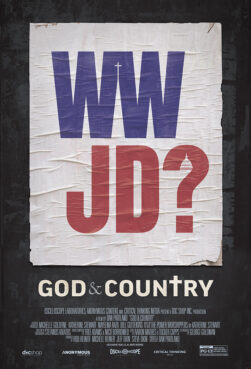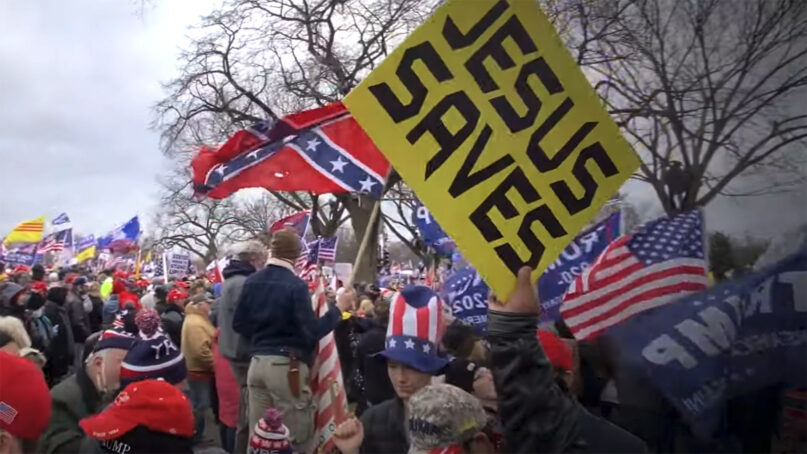(RNS) — In the middle of “God & Country,” Dan Partland and Rob Reiner’s documentary about the rise of Christian nationalism, evangelical pastor and former Christian right activist Rob Schenck drops a bomb. Gerhard Kittel, the famed Lutheran theologian whose Theological Dictionary of the New Testament is still considered the standard in Christian seminaries around the world, was an avowed Nazi. And not just any Nazi: Kittel worked with Hitler himself to launder the Holocaust for German Christians. It is a genuine jump scare, shocking in delivery and chilling in implication.
It’s the sort of energy that “God & Country,” which opens in theaters Friday (Feb. 16), could have used a lot more of. After confronting viewers with this straight line between evangelical orthodoxy and the Third Reich, the documentary does not explore any of Kittel’s actual theology. It does not show why this theology was such an easy pipeline for genocide endorsement. Nor does it attempt to investigate whether Kittel’s legacy may still be warming American Christians to fascism.
Partland’s narrative simply moves on, largely content to contrast Christian nationalism with more moderate Christian conservatism. In doing so, the movie feels like a wasted opportunity to confront conservative Christianity with the fruits of its decades-long labors.
It’s a shame, because the documentary does an admirable job of arguing for its subject’s seriousness. Bookended by harrowing footage from the Capitol grounds on Jan. 6, 2021, “God & Country” makes a compelling case that the rise of anti-democratic sentiment in the Republican Party is animated by Christian nationalism. This case is illustrated by clips from the likes of Charlie Kirk, former national security adviser Michael Flynn, far-right firebrand Greg Locke, U.S. Rep. Lauren Boebert and former President Donald Trump himself, all yelling about “taking America back for God” or some variation thereof.
While that kind of talk may sound familiar and benign to a lot of Christians, “God & Country” recruits a who’s who of Christian experts to explain why it’s gotten so poisonous. The likes of New York Times op-ed columnist David French and Christianity Today Editor-in-Chief Russell Moore join Schenck to both sound the alarm about Christian nationalism and draw a boundary between it and their own Christian praxis.

“God & Country” film poster. (Image courtesy of “God & Country”)
I’m a Christian myself, so I’m sympathetic to such distinctions. But “God & Country” is so eager to reassure its normie Christian viewers that they’re not like those Christian nationalists that it largely fails to explore the porous boundaries between mainstream evangelicalism and Christian nationalism.
The rise of Christo-fascism was not just predictable, but has been predicted since at least the Reagan administration. Many of the moderate conservatives who here decry the dangers of Christian nationalism have lengthy resumes at the top of the most influential Christian institutions in America.
Have any of them examined their own complicity in stoking a Christian nationalism sentiment? Do they regret time spent in the culture war trenches, battling liberals and feminists and the gay agenda while the real threat festered in their backyard? Should the ease with which so many evangelicals got sucked into Trumpism prompt any reflection about the theology itself? If any of these questions were asked, the responses were left on the cutting room floor.
I don’t mean to paint with too broad a brush here. Many of the experts brought in do excellent work. Christian historian Jemar Tisby and “Jesus and John Wayne” author Kristin Kobes Du Mez, in particular, provide critical context about the Moral Majority’s segregationist roots. Bishop William J. Barber II — whose work on the Poor People’s Campaign is one of the nation’s best and clearest examples of a Christian movement motivated by compassion instead of power — speaks movingly about the need for the church to focus on what Jesus actually talked about in the Gospels. Author and historian Anthea Butler’s voice resounds with urgency as she warns of the clear and present threat of Christian nationalism, and she seems far more concerned about its threat to democracy than its threat to the reputation of Christian institutions.
It would have been interesting to see filmmakers give these voices a little more airtime. Likewise, it would have been interesting to hear from, say, Christians in the queer community or on the front lines of the fight for abortion access. Such people have a lot to lose from the Christian nationalist takeover, and many of them have been pushing back against surging nationalism since long before Trump set foot on that escalator. And yet, such voices are almost entirely absent here. One wonders if this was a simple oversight, or if there were concerns that their presence would alienate the #NeverTrump conservatives “God & Country” desperately wants to win over.
Because while normie Christian conservatives may harbor disgust for Christian nationalism, there’s no denying there’s a lot of overlap on the policy goals. Banning things like abortion and gender-affirming care is not considered extreme within the evangelical voting bloc. In fact, some of the talking heads in this documentary have been very clear in their support for such positions.
A sharper documentary might have confronted the Christians both on camera and in the audience with these challenges, asking them to consider the ways in which even “good” Christian theology has enabled this national threat. It might have challenged audiences to consider why a trans kid in Texas should prefer a moderate Christian church to a Christian nationalist one, since they probably wouldn’t feel welcomed in either one. Instead, since I assume virtually no actual Christian nationalists will watch “God & Country,” the documentary seems very unlikely to afflict the comfortable in any meaningful way.
It seems to me that insofar as there is a difference between Christian nationalism and what I’ll call “real Christianity,” it ought to be a difference of kind, not degree. It’s a difference Barber gets at when he says “there’s no way you can look at Jesus of the Gospel and put him on the side of greed, on the side of injustice, on the side of wrong.”
Fair enough, but Christians have been doing just that since long before 2016. Unfortunately, many Christian leaders failed to draw any significant distinction between “the Jesus of the Gospel” and his American Wario, and the former got swapped out for the latter without almost anyone noticing.
Maybe if “real Christians” had spent the last few decades striking a more radical position in keeping with the Jesus of the Gospels — a Jesus against greed and injustice — then the swap would have been a more obviously pathetic grift. But as it is, thanks to the evangelical capitulation to sleazy politics and culture war sniping, Christian nationalism doesn’t really look all that different from most evangelicals’ conception of “real Christianity.” It just looks like a few real Christians got a little carried away.
After Schenck reveals his information about Kittel’s work as a Nazi, he gets briefly overcome by emotion. He clearly regrets his time spent working for a movement he can “no longer even pretend is evangelicalism.”
But that’s the problem. For all intents and purposes, it is evangelicalism. And until that community summons the wherewithal to admit the breadth and depth of the rot, it will continue to spread. Until there is nothing left.
(Tyler Huckabee is a writer living in Nashville, Tennessee, with his wife and dog. You can read more of his writing at his Substack. This column does not necessarily reflect the views of Religion News Service.)





